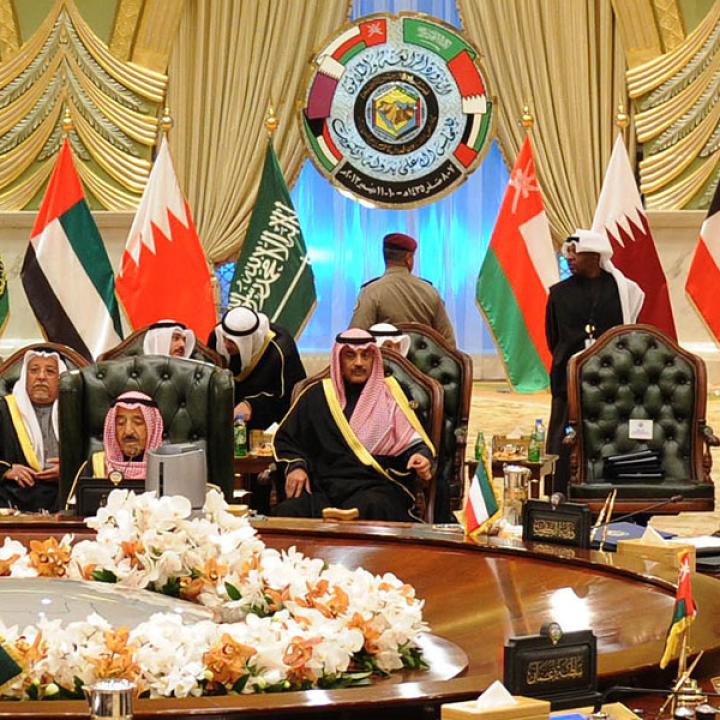

The withdrawal of several ambassadors from Qatar is a setback to U.S. diplomacy with Gulf allies and another item for President Obama's upcoming meeting with the Saudi king.
Earlier today, Saudi Arabia, Bahrain, and the United Arab Emirates recalled their ambassadors from Qatar, choosing a high-visibility tactic to emphasize long-simmering tensions within the Gulf Cooperation Council. The diplomatic rift -- which comes a day after fellow GCC member Oman invited Iran's president to visit, and a few weeks before President Obama's planned visit to Riyadh -- further complicates U.S. efforts to build broad support for its regional policies. Washington had been hoping that the upcoming Saudi trip would not only reassure King Abdullah about U.S. policies on the Iran nuclear issue and Syria, but also serve as an opportunity to win broader Gulf Arab support.
The official reason given for the withdrawal of ambassadors is Qatar's failure to live up to a previously unrevealed three-month-old agreement not to "support any party aiming to threaten the security and stability of any GCC member." This is presumably a euphemism for backing supporters of the Muslim Brotherhood, a group that Saudi Arabia and the UAE in particular regard as a threat to their political systems. Earlier this week, a UAE court sentenced a Qatari doctor to seven years' imprisonment for supporting a "secret illegal organization" believed to be the Brotherhood. Although Qatar has the same political structure as the other Gulf Arab states -- full or quasi-monarchies led by royal or ruling families, and as such incompatible with Brotherhood ideology -- it apparently tolerates the group as long as its energies are directed abroad (for more on this issue, see PolicyWatch 2167, "Brotherhood Trials and Tribulations in the Gulf").
The GCC has united Saudi Arabia, Kuwait, Bahrain, Qatar, the UAE, and Oman in a loose diplomatic coalition since the early months of the Iran-Iraq War, and its crowning success was to keep these important oil-exporting countries out of that conflict. Yet the council has always had its internal tensions; most recently, Qatar and Oman have been at odds with other members regarding their policies on Iran and the revolutions sweeping the Arab world (for more on these issues, see PolicyWatch 2180, "GCC Summit Will Gauge Regional Confidence in U.S. Policy"). For its part, Kuwait has not withdrawn its envoy, perhaps because eighty-four-year-old ruler Sabah al-Ahmed al-Sabah -- who is in the United States recuperating from "successful minor surgery" conducted last weekend -- has been seeking to broker a Qatar-Egypt rapprochement in advance of the Arab Summit to be held in his country later this month.
The ambassador recall announcement, which came at the end of a GCC foreign ministers meeting in Riyadh, offers some clarification on whether Qatari policy has changed since last June's transition to new ruler Sheikh Tamim al-Thani, who replaced his abdicating father, Sheikh Hamad bin Khalifa. The long-serving, diplomatically hyperactive prime minister and foreign minister, Sheikh Hamad bin Jassim al-Thani, was also replaced. At the time, analysts believed Sheikh Tamim would be more of a team player with the GCC, but this does not seem to be the case.
Qatar also continues to walk a diplomatic tightrope in its relations with the United States and Iran. The latter relationship is greatly influenced by the fact that Qatar and Tehran share the world's largest offshore natural gas field. At the same time, the emirate plays host to the U.S. Air Force at the giant al-Udeid Air Base outside Doha, from where all U.S. air operations in the region are controlled. The facility has been vital to U.S. forces in Afghanistan and Iraq, yet Qatar has apparently constrained U.S. deployments intended to deter Iran. Last year, the United States deployed F-22s to the UAE instead, which is less nuanced in its views of Iran's capability for mischief. Qatar also continues to use its Aljazeera satellite television network as an important tool of soft diplomacy -- one that has undermined U.S. positions in the past.
Washington may well have been aware of the diplomatic rift before it was announced. Yesterday, President Obama spoke by telephone with Sheikh Muhammad bin Zayed al-Nahyan, the crown prince of Abu Dhabi and de facto ruler of the UAE; a White House statement said they "shared views on a range of regional issues and common security challenges." Whatever the particulars of their conversation, today's very public GCC rift is a setback to U.S. diplomacy with its Gulf allies and another item for the president's upcoming meeting with Saudi King Abdullah, the council's unofficial leader.
Simon Henderson is the Baker Fellow and director of the Gulf and Energy Policy Program at The Washington Institute.



